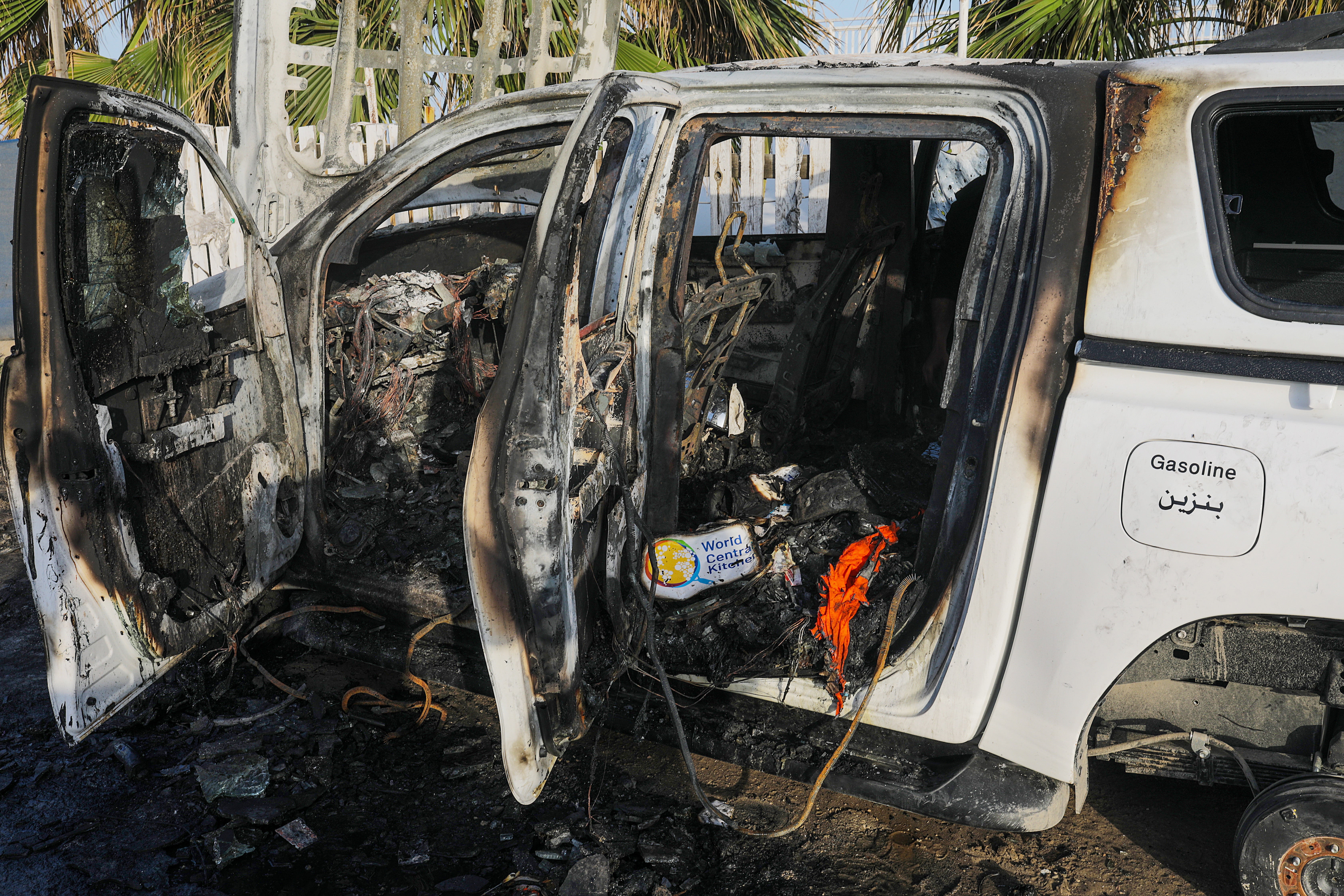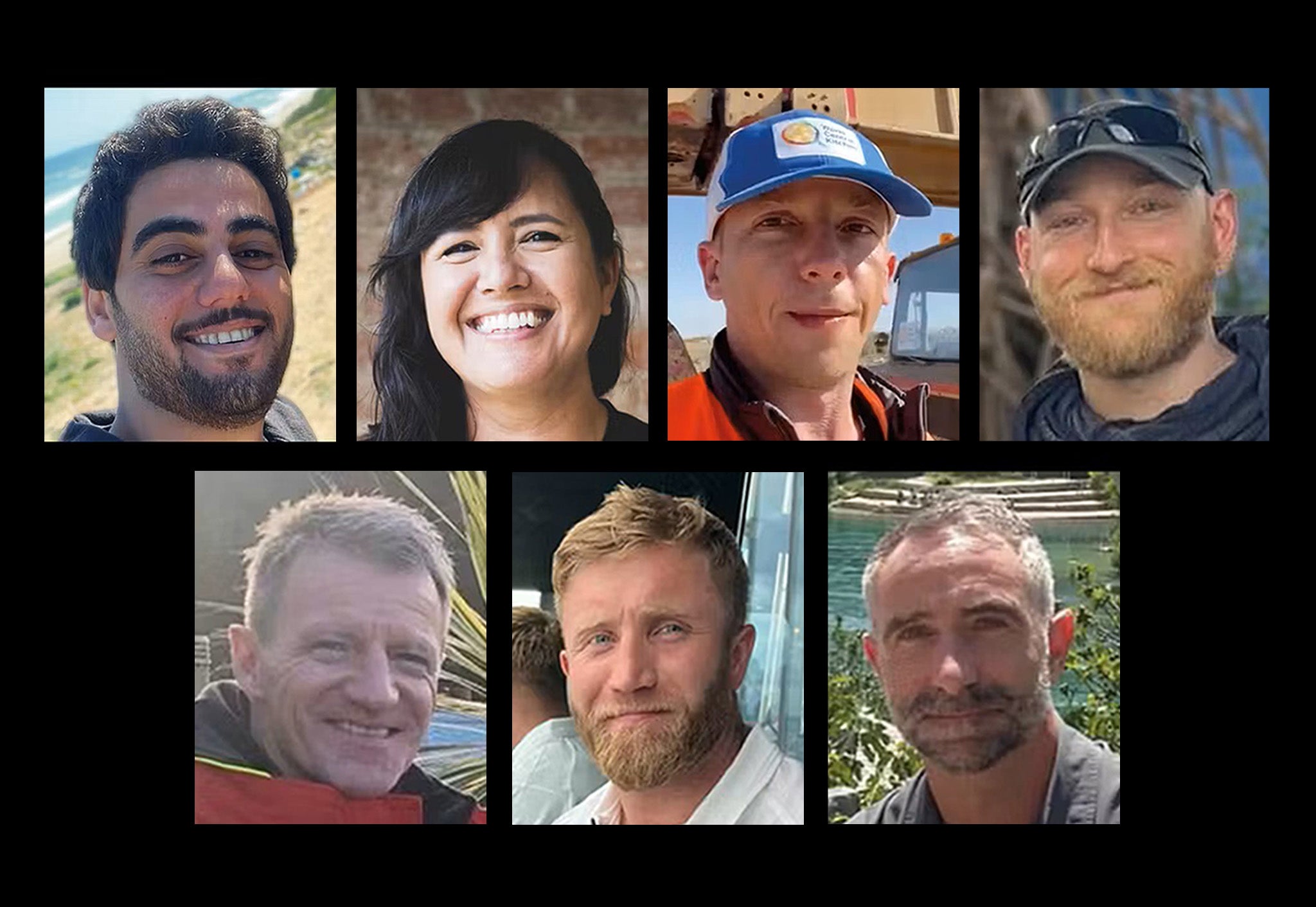What’s even more shocking than three Britons killed in Gaza? They take the death toll of aid workers past 200
Humanitarian volunteers have paid a terrible price for delivering vital aid to people trapped in Gaza’s danger zones. As experts say the UN has recorded the highest number of staff fatalities since the Second World War, Bel Trew assesses the chilling impact of Israeli airstrikes on the food charity convoy


The group of aid workers were coming back from a long day coordinating the latest delivery of supplies to Gaza via a new maritime corridor to help fight a looming famine in the 42km strip. The aid, coordinated with Israel and Cyprus, was handled by World Central Kitchen (WCK), a US-based charity which feeds people across the world’s front lines and disaster zones.
A Palestinian aid worker back at their base in Deir al-Balah, in central Gaza, told The Independent he was waiting for the team to get home.
But just after 10pm local time, Israel pounded the three-vehicle convoy, killing all seven aid workers including three British citizens. This, despite the fact they were travelling in a deconflicted zone in cars branded with the WCK logo and their movements were coordinated with the Israelis.
“This is not only an attack against WCK,” said the charity’s CEO Erin Gore as the world reeled from the news. “This is an attack on humanitarian organisations showing up in the most dire of situations where food is being used as a weapon of war.”
But the deadly series of strikes was not the first time that an aid convoy has been hit in Gaza, or the first time humanitarians have been killed.
In fact, according to the United Nations, as of 20 March, 196 aid workers had been killed in Gaza since Israel launched its heaviest bombardment of the strip yet, in retaliation for Hamas’s bloody attack in southern Israel on 7 October. With the seven deaths this week, the total of humanitarian workers killed now exceeds 200.
“This was not an isolated incident,” said Jamie McGoldrick, the UN’s humanitarian coordinator for the Palestinian occupied territories. “[Gaza] has become one of the world’s most dangerous and difficult places to work.”
These concerns were echoed by the UN’s largest agency operating in Gaza, UNRWA, which told The Independent that 176 of its staff have been killed since the war began, some of them while delivering vital aid.

The most recent incident was in March when two team members were killed during an Israeli strike on a UNRWA supply warehouse. This is even though every morning, the agency shares the coordinates of its facilities with all parties to the conflict, including the Israeli military, to avoid being hit.
“There have been more than 160 hits on UNWRA facilities, including those sheltering displaced families. More than 400 people have been killed when those shelters were hit,” said spokesperson Juliette Touma.
“Never in the history of the UN have we recorded such a huge human toll among UN staff – not since the end of the Second World War when we started operating. Not in any armed conflict or even natural disaster. Gaza is one of the most dangerous places in the world right now for aid workers.”
The level of danger is now forcing aid agencies and charities to reconsider their presence in Gaza, and even to pull back.
Gaza is one of the most dangerous places in the world right now for aid workers
The impact of the slaughter of the WCK team is having a chilling impact on efforts to feed Gaza’s 2.3 million-strong population, half of whom are facing extreme levels of hunger.
Almost immediately, WCK said it was having to suspend its operations in Gaza where it has provided well over 30 million meals since Israel launched its ferocious bombardment of the strip. According to the Cypriot authorities, ships carrying 240 tonnes of aid en route to Gaza have also turned back.
The UAE, which partly funded the aid that WCK brought in by sea, said it was also pausing humanitarian aid efforts through the maritime corridor.
Several charities and non-governmental organisations also said they were forced to suspend their work, fearing for the lives of their team members.
Among them was Anera, a Washington-based aid group whose own staff member, Mousa Shawwa, a logistics coordinator, was killed in a March Israeli strike, even though the coordinates of his shelter had also been provided to the Israeli military.
Anera said that in the wake of the strikes, it was taking the “unprecedented” step of pausing its operations in Gaza, where it had been helping to provide around 150,000 meals daily.

“The escalating risks associated with aid delivery leave us with no choice,” it said in a statement.
The concern is more aid agencies will follow suit, meaning families will get less food during a looming famine which UN agencies say is “man-made”, due to Israel’s crippling restrictions on what is allowed into and through Gaza.
Israel denies restricting aid – but an investigation by The Independent heard testimony from dozens of aid workers who accused the country of blocking aid from reaching those in need.
UNRWA, meanwhile, has been accused by Israel of perpetuating the conflict and is barred from making deliveries to the north of Gaza. Its officials urged the Israelis to reconsider this, knowing they will need to step in.
“We call on the Israeli authorities to reverse their decision last week that banned UNRWA from delivering food assurances to the north. The easiest, fastest, cheapest and safest way to deliver humanitarian assistance is via the road, and that we have not been able to do since 29 January,” Ms Touma told The Independent.
“This is needed more than ever because of the situation, the famine risk. Children are dying of dehydration, hunger and malnutrition. This can be averted.”
Prime minister Benjamin Netanyahu said Israel’s deadly strikes were unintended and “tragic”, and the military pledged an independent inquiry.
The Israeli military and Cogat, the defence ministry body which coordinates with the Palestinians, have told The Independent in multiple statements that they are facilitating aid into Gaza and there are no restrictions on the delivery of aid. They also said that they “worked closely” with aid organisations to coordinate their efforts.
The reality on the ground tells a different story.
Subscribe to Independent Premium to bookmark this article
Want to bookmark your favourite articles and stories to read or reference later? Start your Independent Premium subscription today.





Join our commenting forum
Join thought-provoking conversations, follow other Independent readers and see their replies
Comments